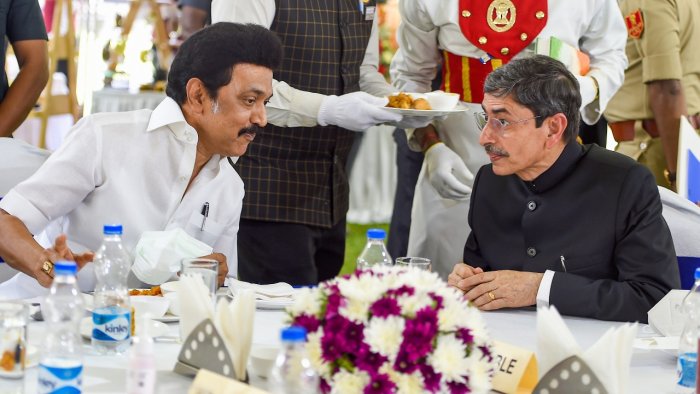
Perarivalan case: Why SC verdict gives Stalin an edge in face-off with TN Governor

Tamil Nadu Chief Minister MK Stalin’s battle to prevent his government’s decisions getting blocked at the Raj Bhavan has received a major boost through the Supreme Court judgement in the Perarivalan case. The landmark verdict of the Supreme Court will have a major impact on a number of decisions that await Tamil Nadu Governor RN Ravi’s nod after being cleared by the state legislative assembly. More than a dozen Acts passed by the Tamil Nadu assembly are awaiting the governor’s approval.
Kumanan Durai, standing counsel for Tamil Nadu in the Supreme Court terms the judgement a “phenomenal victory” for the state government. Speaking to The Federal soon after the historic judgement was delivered by the apex court, he said the “judicial review” exercised by the Supreme Court points out that delay in approval by the governor was “prima facie” wrong. The state government’s rights established through this verdict would be applicable in all similar cases and other state governments as well, he said.
Also read: REPLUG: All about Article 142, which allowed SC to release Perarivalan
The chief minister consistently followed up on the case and interacted with advocates to uphold the “Right of the State” in this case, Kumanan said. He attributed the “phenomenal victory” of the Tamil Nadu government to the initiatives of the chief minister. Stalin was providing the necessary guidance for the legal initiatives even as he was urging the Centre to ensure that the initiatives taken by the state government were not blocked.
A key issue in the Perarivalan case was whether the decision of the state cabinet under Article 161of the Constitution was binding on the governor of the concerned state. In its verdict, the Supreme Court emphasized that cabinet decisions taken under Article 161 of the Constitution binds the governor, Kumanan said. “We are very proud that it (acceptance of our argument) has finally happened,” he added.
It means, the governor has to act on the decisions of the state cabinet, Kumanan said. This is exactly the line of argument that the MK Stalin government has been taking in the Perarivalan case and other tussles with the governor. These standing disputes include a state government decision to exempt students of Tamil Nadu from the NEET medical entrance exam. Stalin has written to Prime Minister Narendra Modi in this regard and also placed requests in person when the two met in New Delhi.
Also read: Rajiv Gandhi assassination case: SC orders release of Perarivalan
The Supreme Court verdict not only binds the governor to approve decisions of the state cabinet, but also disapproves delay made by him. The apex court has used its “judicial review” in disapproval of the Governor’s delay, Kumanan emphasised. “The governor sitting on the file without taking any decision for more than two-and-a-half years was “prima facie” wrong,” he said. That is why the Supreme Court had to intervene in this issue.
Kumanan said the governor’s forwarding the issue to the President was unconstitutional. The governor has to act in such cases since decisions taken by the state cabinet under Article 161 are binding, he added.
Also read: Arputhammal: Three decades of fight for her son’s freedom
The “ratio” or the principle laid down by the Supreme Court in this case would also apply to other similar cases not only in Tamil Nadu but also in other states. The apex court’s view that the state government’s decisions should not be blocked by the Raj Bhavan was also reflected in the questions posed by the judges during the final stage hearings in the Perarivalan case.

